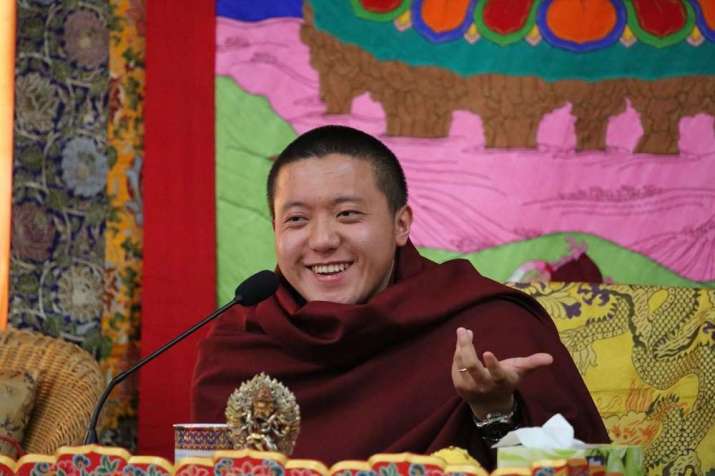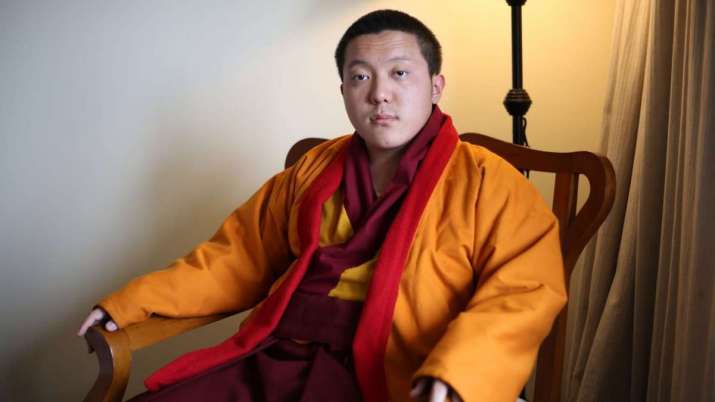FEATURES|THEMES|People and Personalities
Regaining Our Simplicity and Humanity: Dilgo Khyentse Yangsi Rinpoche on Practice in Modern Times
 Dilgo Khyentse Yangsi Rinpoche. Image courtesy of Dilgo Khyentse Yangsi Rinpoche
Dilgo Khyentse Yangsi Rinpoche. Image courtesy of Dilgo Khyentse Yangsi RinpocheOn 1 November, Buddhistdoor Global caught up with Dilgo Khyentse Yangsi Rinpoche for a conversation about the authentic practice of Buddhism in today’s ever more complex world. Born on 30 June 1993 in Nepal, Rinpoche is the incarnation of the late Vajrayana master and Nyingma head Dilgo Khyentse Rinpoche (1910–91). Educated in Bhutan and having all the empowerments that Dilgo Khyentse Rinpoche received, he is intimately aware of the challenges facing Buddhism in today’s times. He is a deeply compassionate and perceptive teacher committed to the future of Buddhism.
Buddhistdoor Global: You are in Hong Kong to give a Dharma talk titled, “An Introduction to the Genuine Practice of Buddhism in Modern Times.” Can you explain a bit about how you define genuine practice for people today?
Yangsi Rinpoche: The Buddha himself taught very clearly and carefully that we can adjust how we teach the Dharma to any situation, to any circumstances, and era. The world during the time of the Buddha was immensely different to our present day, so what has happened to the Dharma? The Dharma has remained the same in terms of principles, but it has gradually adjusted itself to modern times and modern people. Nowadays, people’s minds have become very materialistic and everything has become commercialized. This has allowed human beings to lose their humanity a bit. As you can see, human beings have become more aggressive, more towards what I like to call a certain kind of barbarism. The cavemen did have to protect themselves, but not to the extent of mass slaughter, not to the extent of invasion, not to the extent of taking advantage of each other to the extremes that we see today.
On top of that, human beings nowadays see things more negatively and have more trouble seeing the positive side. Modern life consumes people to the point where human beings lose their ability to just be good, simple, and kindhearted people. I always like to say that when you swim in the ocean, you’re afraid of the sharks. But now we’ve become the sharks; we’re preying on innocents on a mass scale.
Nowadays human beings, individuals, have contaminated the Dharma in a very commercialized manner for personal gain, money, and power. So my message is: Dharma should never be used for personal reasons. Dharma itself is an immeasurably great teaching given by the Buddha directly to his disciples and must be sustained for as long as possible.
BDG: One of the greatest problems in contemporary times seems to be the disconnect between our expectations and the reality of the world around us. Do our culture and our media feed into this disconnect?
YR: Oh, yes, this problem has existed for a long time. The media has always propagated and promoted being rich, for example. Having a big lavish house is important. Having a nice limousine is important. That has been propagated for a very long time. Even farmers in their own simple houses and going about their daily work are watching this and will feel intimidated. They want to get [these luxuries] too, but they cannot. It’s impossible for them. So what do they do? They try their best to work hard for the next generation. They pressure their children to make as much money as possible and become rich. This is destroying everything.
I would say that people are disconnected within. They are disconnected not just from the world, but also from themselves. Being a human being, a good person, a simple person, who is helping in whatever small way—what more can you ask for? You buy the biggest house in the whole world: how many people are you going to make happy? Only one person, yourself. How much are you going to feed your greed? For how long? We are losing our humanity. The world actually hasn’t changed at all. Human beings have changed a lot, and not in a good way. We have lost our sense of simplicity and our sense of humanity or dignity.
Being content, being able to renounce, being able to appreciate everything in life, and also being able to help people in whatever way we can—that is what being a simple, good-hearted person means.
 Dilgo Khyentse Yangsi Rinpoche. Image courtesy of Dilgo Khyentse Yangsi Rinpoche
Dilgo Khyentse Yangsi Rinpoche. Image courtesy of Dilgo Khyentse Yangsi RinpocheBDG: How can we protect ourselves from such negative influences?
YR: There’s no way to protect ourselves—we live in this world. But we can try to be alert to the fact that it is we human beings who have created all of this. I think we should have the answer as well. Just look at animals. Animals might be less intelligent compared to us, but they don’t follow commercials on TV. What we can do is to know what is best for us in life, and what our life path should be. Even if we try to protect ourselves, we will be influenced. This is our world. But we should know that this is a contemporary thought. It’s more important to know what we are doing with our lives, to know our identity, to know what we’re here for. We aren’t here to know what greed desires from us, what negativity tells us to do.
BDG: How would you advise writers, artists, and others people to create uplifting Dharma media?
YR: If you really talk about Dharma, people should stop promoting anything. Every day people should appreciate what they have and help each other as much as they can. Always offer a helping hand to someone who needs it in this world. We are one family, one people. I’m not a writer or an artist, but what I do know is that we should not try to create something that is unique, or new, or flashy. Don’t think that you should make something to attract people’s attention, but instead make it so they can enjoy what it is. Just make something that is usable for people, something for people to appreciate and get a sense of positivity.
BDG: Instability and turbulence seems to be characteristic of our times. How do you feel about the future of friendships between nations in times where nationalism and anger seem to take the lead?
YR: It’s very hard to say. I’m not a politician but what I could say is that nothing in the world will settle down unless the minds of human beings settle down. For hundreds and hundreds of years people have always been in conflict, fighting each other—it’s not something new.
BDG: What would you say is the broader legacy of your predecessor Dilgo Khyentse Rinpoche and how do you see the future development of Buddhism?
YR: I feel that his main quality was being a great human being. He was a very good father to his daughters, a very good husband to his wife, a very good friend to the people around him, a really good listener. Anybody could lean on him and trust him. He was like a secret box for anybody who had problems, they could share anything with him. He was everything to people. So I don’t know how to describe it in words, but he was just there.
I can’t predict what will happen in the future, but I still think Buddhism will spread around the world. However, it’s harder to say if there will be any proper Dharma in the future. Buddhism is spreading now, but it’s hard to say if there will be any genuine practitioners coming up in the near future. I hope for the best. It will depend on the individuals.
Related features from Buddhistdoor Global
A Manifestation of Profound Wisdom and Compassion—Remembering Dilgo Khyentse Rinpoche














